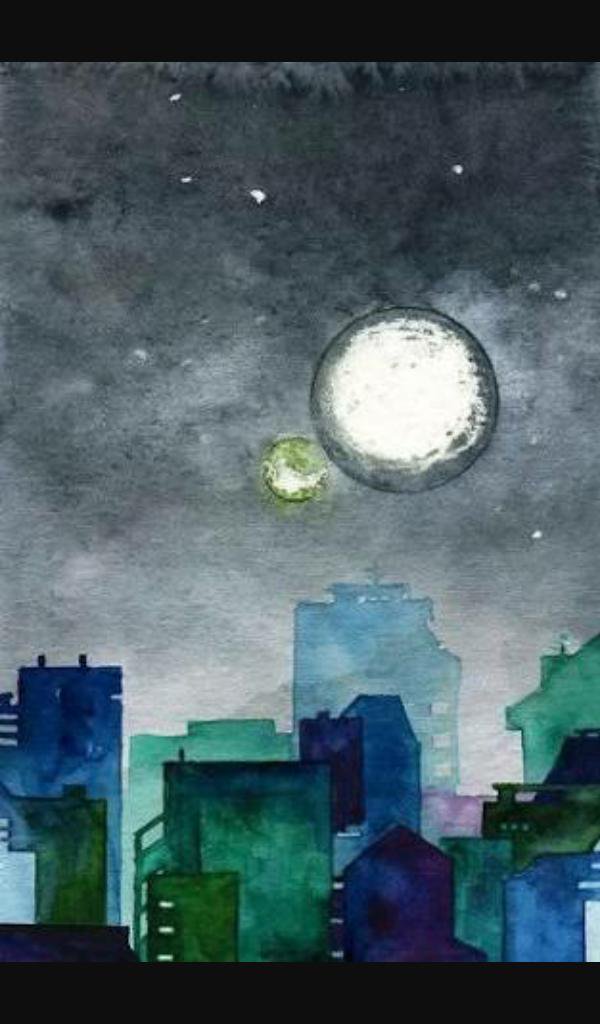When Aomame looked up at the night sky, two moons gazed back at her. She didn’t talk to anyone about it, she wasn’t sure if she was going crazy, or if something in the universe had quietly shifted without her noticing. In any case, just as it’s not a good idea to go around telling people when you hear voices that they can’t hear, Aomame didn’t want to admit she was seeing something so unusual.
Aomame is a character in 1Q84, by Haruki Murakami. I’m currently about half way through. I don’t read Murakami terribly often. When I do, his work gives me uncomfortable dreams, and leaves me questioning the existence of apparently real surroundings, not unlike his protagonist when she looks up and sees two moons. In the book, Aomame grew up in a strict Christian family. Her parents made her recite a prayer before meal times: “O Lord in Heaven, may Thy name be praised in utmost purity for ever and ever, and may Thy kingdom come to us.” Aomame renounced her faith as a young girl, yet, as she notices odd changes in the world, she thinks to herself: And the kingdom is coming.
Sometimes, when I look around, things also seem a bit off in this world. This year, it’s too hot in Kathmandu for February. Spring came far too soon. The rhododendrons are already in bloom, and it’s not even March.. I can’t trust this moon, either, even though there is only one; in middle school, my physics teacher told me the moon moves a little farther from Earth each year. In the time of the dinosaurs it must have appeared much larger. I think of my home in California, where I find plastic scattered all over the sand on holidays, hot asphalt streets and track homes where there used to be oak trees and lagoons, a multi-storied condo complex where my favorite pizza place used to be. How did everything change so fast? What Kingdom is coming, exactly, and who’s in charge?
In Buddhism, the appearance of your surroundings doesn’t depend on the volition of a God bestowing or withholding his Kingdom. It depends on your mental and emotional disposition. If you’re angry, you look around and see enemies. If you’re happy, you look around and see friends. If you’re enlightened, you look around and see Buddhas. Your mental state shapes the realm you inhabit. In fact, the word for realm in Tibetan, kham, can also mean choice. We choose what Kingdom comes.
This kham that surrounds us doesn’t seem like something of my choice. There is plastic and asphalt and parking structures. Wars are commonplace; race-based violence divides even the country that’s supposed to lead the free world. Irresponsible resource extraction continues even though we know it will eventually destroy humanity and everyone we share space with. Soundscapes of forests and oceans show that things in the nonhuman world have quieted down in the past few decades, billions of creatures have been silenced by human recklessness. This kham seems like that of someone incredibly destructive.
Aomame considers two explanations for why there are two moons in the sky: either she is going crazy, or something external has shifted. Ultimately, she goes with the latter explanation; she is no longer in 1984, but in 1Q(uestion)84. She sees herself as living in a Kingdom that has been imposed on her from the outside.
Of course Aomame is right. She didn’t choose anything. And of course I’m right. I didn’t choose this world that I was born into. Though we’ve both made an enormous oversight. She and I believed the abnormalities in our worlds could be either attributable to a) me or b) someone else like God or Wallstreet or Donald Trump, etc. Our fear and surprise at these unwelcome changes is rooted in the idea that we have selves, as do others, and when things go wrong it’s either my fault or their fault. Aomame looks at two moons in the sky and she thinks weird. I’m used to the idea of one moon, but now there are two, so something must be wrong. I look at plastic on the ground and I think bad. I am good because I don’t use so much plastic, and other people are bad because they do.
To be honest with you, I’ve tragically misread and misunderstood kham from the beginning. I spoke of it as if it’s a choice conducted by a discrete self. But choice can’t be understood in Tibetan in the same way we understand it in English. Rather, it’s more of a motivation, an intention, less of an action. If my intention is to carry out good activities as a discrete self, of course I will see others inflicting harm; if there is self, one sees other. If Aomame intends to live in a world with one moon, the result is that a world with two moons will seem strange.
Whether you’re attached to one self, one moon, or there being enough water to flush the toilet properly, this attachment will surely lead you astray when you encounter something different. The strangeness of our surroundings varies directly with the strength of our belief in something normal. Two moons would, in fact, be very beautiful if we weren’t so afraid of them.
Book mentioned: 1Q84 by Haruki Murakami.
